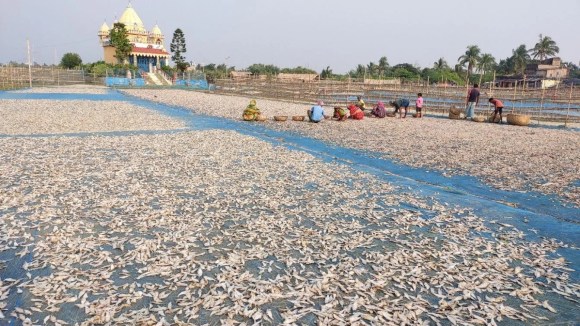The history of dried fish with its significance in the Bengal area starts from the medieval era. Dried fish got to India via the port cities such as Bombay, Visakhapatnam and Chennai by the inter-state and intra-state trades with the railways in the mid-19th century. Popularly known as ‘Shutki’, dried fish is emblematic to the cultural oneness of (dis)integrated Bengal wherein Bengalis either relished dried fish with uncompromising endearment or rejected it because of the repugnant odor of a decaying fish.
The scoping research focused on two coastal districts of West Bengal: South 24 Parganas and East Medinipur.
Key findings
Small-scale fishers and labourers from neighbouring villages convene to work at camps known as “shabars”. Workers at these camps come from diverse social backgrounds. Women at these camps are often engaged through exploitative “no-work-no-pay” contracts and do not receive additional payment for overtime labour.

The Egra market in East Medinipur is the largest dried fish market of West Bengal. Consumers prefer unsalted dried fish, and they are willing to pay for hygienically prepared dried fish with desirable features.
The makeshift practices of fish drying have resulted in a condition of “making a living in transience” which necessitates ongoing adaptations. Socially and culturally significant events are focal points in the system of dry fish production, despite not being recognized by the formal administrative and legal systems.
While there is documented evidence that indigenous fish species are in decline due to commercial overfishing and unsustainable processing, the onus is borne by artisanal small-scale fishers, who face legal barriers, challenges and often outright prohibition of their established practices.

Land tenure is a dominant concern for dried fish producers in West Bengal.
Recommendations
The report recommends co-management, co-monitoring, and partnership as imperatives within formal dried fish management to generate species recovery and enhance sustainability of the dried fish system. The authors also advise an Interactive Governance approach to effectively identify and support opportunities in the dried fish sector of West Bengal.
Reference
Ghosh, Raktima, Jenia Mukherjee, Amrita Sen, Souradip Pathak, Anuradha Choudry, and Shreyashi Bhattacharya. 2022. “Dried Fish in West Bengal, India: Scoping Report.” DFM Working Papers. The University of Manitoba & Indian Institute of Technology Kharagpur.

